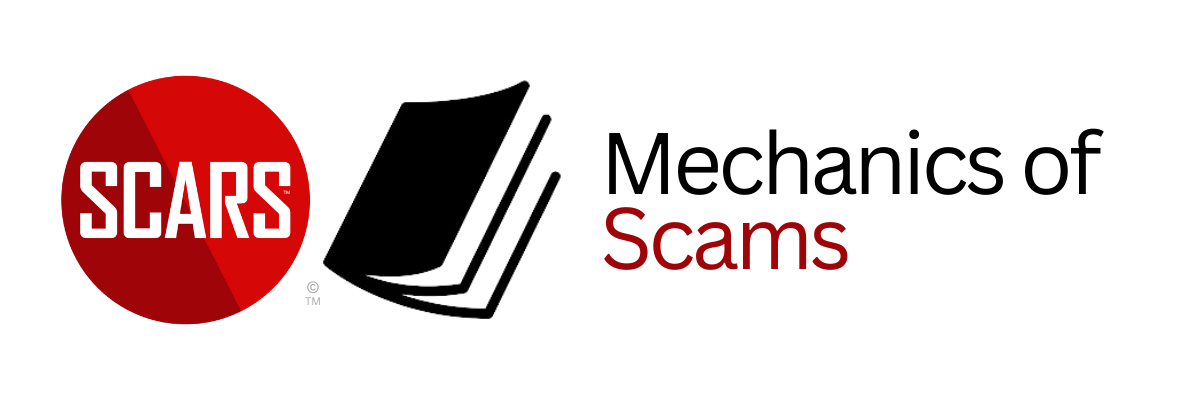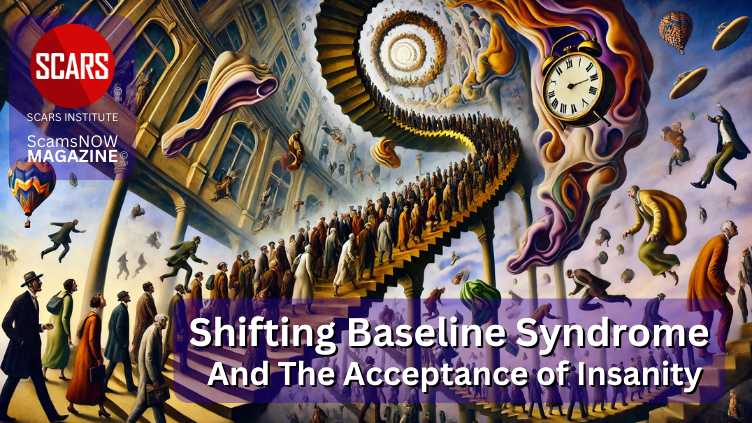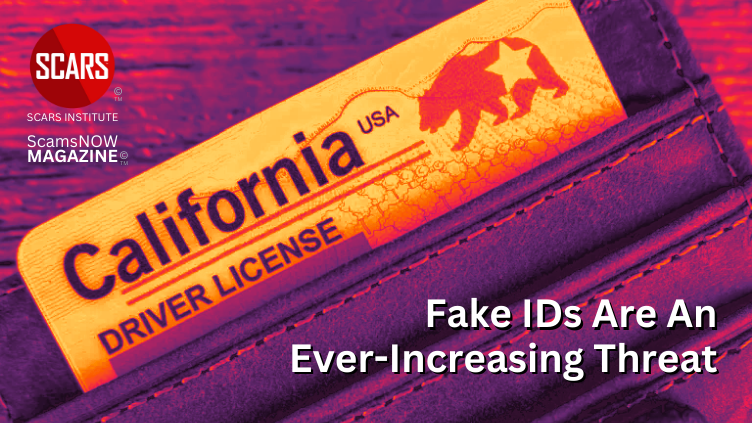Fake IDs are an Ever-Increasing Threat and Massively Contribute to All Forms of Scams and Fraud
The Underground Market for Counterfeit Identification (Fake IDs) is Surging in Sophistication, a Significant Challenge to Law Enforcement and Public Safety
Primary Category: Criminology
Intended Audience: General Public
Author:
• SCARS Editorial Team – Society of Citizens Against Relationship Scams Inc.
About This Article
The underground market for counterfeit identification has evolved into a sophisticated industry, posing a major challenge to law enforcement and public safety. High-quality fake IDs now incorporate advanced security features such as holograms, barcodes, and laser engravings, allowing criminals to bypass verification systems. The rise of state policies granting driver’s licenses to undocumented immigrants has further complicated identity verification, while the REAL ID Act has driven demand for counterfeit documents.
Beyond traditional fraud, fake IDs are widely used in online scams, enabling cybercriminals to create fraudulent accounts, launder money, and deceive victims through fake personas on dating platforms, financial institutions, and e-commerce sites. With the dark web fueling access to these forgeries, AI-driven verification and biometric security measures are increasingly critical in combating identity fraud and protecting victims from deception.

The Underground Market for Counterfeit Identification (Fake IDs) is Surging in Sophistication, a Significant Challenge to Law Enforcement and Public Safety
Historically, fake IDs were primarily associated with underage individuals seeking access to age-restricted venues. However, as reported by The New York Times, modern counterfeiters have elevated their craft, producing fake IDs that incorporate advanced security features such as holograms, barcodes, and laser engravings. These enhancements enable the forgeries to bypass electronic scanners and deceive even the most vigilant security personnel.
The proliferation of these high-quality fake IDs is facilitated by online platforms where counterfeiters advertise state-specific replicas, accept cryptocurrency payments, and utilize sophisticated equipment to replicate official documents. Websites detail specifications with “scientific specificity,” including card thickness measured in micrometers and the inclusion of security elements like embedded data chips and ultraviolet features. This level of detail has led to a significant increase in the detection of counterfeit IDs. For instance, Chicago’s O’Hare International Airport reported the confiscation of 984 fake licenses in less than a week. Steve Bansbach, a federal Customs and Border Protection spokesman, emphasized that these counterfeit IDs pose threats beyond underage drinking, including potential use in identity theft and human trafficking.
The issue is further complicated by varying state policies regarding the issuance of driver’s licenses to undocumented immigrants. As of October 2023, nineteen U.S. states, along with the District of Columbia and Puerto Rico, have enacted laws allowing undocumented individuals to obtain driver’s licenses or permits. These jurisdictions include California, Colorado, Connecticut, Delaware, Hawaii, Illinois, Maryland, Massachusetts, Minnesota, Nevada, New Jersey, New Mexico, New York, Oregon, Rhode Island, Utah, Vermont, Virginia, and Washington. These policies aim to improve road safety and provide access to essential services for all residents. However, they have also sparked debates over potential risks, such as the facilitation of fraud and challenges in identity verification. For example, in Oregon, election officials removed over 1,200 voters from the rolls for failing to provide proof of U.S. citizenship upon registration. This incident highlights the complexities and unintended consequences that can arise from such policies.
The introduction of the REAL ID Act has added another layer to the discussion. This federal law establishes minimum security standards for state-issued driver’s licenses and identification cards, aiming to enhance the reliability and accuracy of state-issued identification documents. While the act seeks to bolster national security, it has also led to concerns about accessibility and the potential for increased use of counterfeit IDs to circumvent stringent requirements.
Fake IDs and Their Role in Online Scams
While fake IDs have long been associated with underage drinking and identity fraud, their role in online scams is rapidly growing. Fraudsters use counterfeit identification to create and maintain fraudulent accounts, launder money, and deceive victims in various digital schemes. With the rise of remote identity verification, these sophisticated forgeries are becoming a major tool in the arsenal of cybercriminals.
One of the most common uses of fake IDs in online scams is in romance and investment fraud. Scammers often establish multiple fake identities to engage victims in long-term deception, using fake government-issued IDs to “prove” their legitimacy. Victims who request verification from a supposed love interest or business partner may be presented with a counterfeit driver’s license or passport, reinforcing the illusion of trust. These fake IDs are also used to open accounts on dating websites, cryptocurrency exchanges, and online marketplaces, allowing scammers to operate without exposing their real identities.
Another alarming trend is the use of high-quality fake IDs in bank fraud and financial scams. Cybercriminals leverage them to open bank accounts in stolen identities or create synthetic identities by combining real and fictitious information. These fraudulent accounts are then used for money laundering, transferring stolen funds, or cashing out proceeds from scams. Financial institutions rely on identity verification as a primary security measure, but with the rise of near-perfect fake IDs, even stringent KYC (Know Your Customer) protocols can be circumvented.
Fake IDs also play a crucial role in government benefits fraud. Scammers use forged identification documents to apply for unemployment benefits, Social Security payments, and pandemic relief funds. The surge in digital application processes has made it easier for criminals to submit fraudulent claims using stolen or synthetic identities. With billions lost annually to fraud, fake IDs have become a critical component of large-scale identity theft operations.
In the world of e-commerce and marketplace scams, fake IDs are used to create fraudulent seller accounts on platforms like Amazon, eBay, and Facebook Marketplace. Scammers use them to pose as legitimate vendors, sell non-existent products, and disappear before buyers realize they’ve been duped. By using high-quality fake IDs, criminals can create multiple accounts, avoiding detection even after being reported.
Moreover, dark web marketplaces have fueled the spread of sophisticated counterfeit IDs. Fraudsters can purchase high-quality forgeries tailored to specific states and countries, complete with scannable barcodes, holograms, and watermarks. These are then used to build fraudulent personas, commit financial crimes, and evade law enforcement.
With the growing sophistication of fake IDs, combating their role in online scams requires more than traditional document verification. Financial institutions, online platforms, and law enforcement agencies must employ advanced fraud detection tools, including AI-driven identity verification, biometric authentication, and blockchain-based identity solutions. Until stronger security measures are widely adopted, fake IDs will continue to fuel a vast range of cybercrimes, from romance scams to financial fraud, making it harder to protect victims from sophisticated deception.
Summary
In summary, the evolution of counterfeit identification presents multifaceted challenges that intersect with immigration policies, state regulations, and federal security measures. Addressing this issue necessitates a balanced approach that considers the need for secure identification systems while ensuring equitable access to essential services for all residents.
-/ 30 /-
What do you think about this?
Please share your thoughts in a comment below!
-/ 30 /-
What do you think about this?
Please share your thoughts in a comment below!
TABLE OF CONTENTS
- The Underground Market for Counterfeit Identification (Fake IDs) is Surging in Sophistication, a Significant Challenge to Law Enforcement and Public Safety
- About This Article
- The Underground Market for Counterfeit Identification (Fake IDs) is Surging in Sophistication, a Significant Challenge to Law Enforcement and Public Safety
- Fake IDs and Their Role in Online Scams
- Summary
CATEGORIES
![NavyLogo@4x-81[1] Fake IDs are an Ever-Increasing Threat and Massively Contribute to All Forms of Scams and Fraud - 2025](https://scamsnow.com/wp-content/uploads/2025/04/NavyLogo@4x-811.png)
ARTICLE META
Important Information for New Scam Victims
- Please visit www.ScamVictimsSupport.org – a SCARS Website for New Scam Victims & Sextortion Victims.
- SCARS Institute now offers its free, safe, and private Scam Survivor’s Support Community at www.SCARScommunity.org – this is not on a social media platform, it is our own safe & secure platform created by the SCARS Institute especially for scam victims & survivors.
- SCARS Institute now offers a free recovery learning program at www.SCARSeducation.org.
- Please visit www.ScamPsychology.org – to more fully understand the psychological concepts involved in scams and scam victim recovery.
If you are looking for local trauma counselors, please visit counseling.AgainstScams.org
If you need to speak with someone now, you can dial 988 or find phone numbers for crisis hotlines all around the world here: www.opencounseling.com/suicide-hotlines
Statement About Victim Blaming
Some of our articles discuss various aspects of victims. This is both about better understanding victims (the science of victimology) and their behaviors and psychology. This helps us to educate victims/survivors about why these crimes happened and not to blame themselves, better develop recovery programs, and help victims avoid scams in the future. At times, this may sound like blaming the victim, but it does not blame scam victims; we are simply explaining the hows and whys of the experience victims have.
These articles, about the Psychology of Scams or Victim Psychology – meaning that all humans have psychological or cognitive characteristics in common that can either be exploited or work against us – help us all to understand the unique challenges victims face before, during, and after scams, fraud, or cybercrimes. These sometimes talk about some of the vulnerabilities the scammers exploit. Victims rarely have control of them or are even aware of them, until something like a scam happens, and then they can learn how their mind works and how to overcome these mechanisms.
Articles like these help victims and others understand these processes and how to help prevent them from being exploited again or to help them recover more easily by understanding their post-scam behaviors. Learn more about the Psychology of Scams at www.ScamPsychology.org
SCARS INSTITUTE RESOURCES:
If You Have Been Victimized By A Scam Or Cybercrime
♦ If you are a victim of scams, go to www.ScamVictimsSupport.org for real knowledge and help
♦ SCARS Institute now offers its free, safe, and private Scam Survivor’s Support Community at www.SCARScommunity.org/register – this is not on a social media platform, it is our own safe & secure platform created by the SCARS Institute especially for scam victims & survivors.
♦ Enroll in SCARS Scam Survivor’s School now at www.SCARSeducation.org
♦ To report criminals, visit https://reporting.AgainstScams.org – we will NEVER give your data to money recovery companies like some do!
♦ Follow us and find our podcasts, webinars, and helpful videos on YouTube: https://www.youtube.com/@RomancescamsNowcom
♦ Learn about the Psychology of Scams at www.ScamPsychology.org
♦ Dig deeper into the reality of scams, fraud, and cybercrime at www.ScamsNOW.com and www.RomanceScamsNOW.com
♦ Scam Survivor’s Stories: www.ScamSurvivorStories.org
♦ For Scam Victim Advocates visit www.ScamVictimsAdvocates.org
♦ See more scammer photos on www.ScammerPhotos.com
You can also find the SCARS Institute’s knowledge and information on Facebook, Instagram, X, LinkedIn, and TruthSocial
Psychology Disclaimer:
All articles about psychology and the human brain on this website are for information & education only
The information provided in this and other SCARS articles are intended for educational and self-help purposes only and should not be construed as a substitute for professional therapy or counseling.
Note about Mindfulness: Mindfulness practices have the potential to create psychological distress for some individuals. Please consult a mental health professional or experienced meditation instructor for guidance should you encounter difficulties.
While any self-help techniques outlined herein may be beneficial for scam victims seeking to recover from their experience and move towards recovery, it is important to consult with a qualified mental health professional before initiating any course of action. Each individual’s experience and needs are unique, and what works for one person may not be suitable for another.
Additionally, any approach may not be appropriate for individuals with certain pre-existing mental health conditions or trauma histories. It is advisable to seek guidance from a licensed therapist or counselor who can provide personalized support, guidance, and treatment tailored to your specific needs.
If you are experiencing significant distress or emotional difficulties related to a scam or other traumatic event, please consult your doctor or mental health provider for appropriate care and support.
Also read our SCARS Institute Statement about Professional Care for Scam Victims – click here
If you are in crisis, feeling desperate, or in despair, please call 988 or your local crisis hotline – international numbers here.
More ScamsNOW.com Articles
A Question of Trust
At the SCARS Institute, we invite you to do your own research on the topics we speak about and publish. Our team investigates the subject being discussed, especially when it comes to understanding the scam victims-survivors’ experience. You can do Google searches, but in many cases, you will have to wade through scientific papers and studies. However, remember that biases and perspectives matter and influence the outcome. Regardless, we encourage you to explore these topics as thoroughly as you can for your own awareness.
























![scars-institute[1] Fake IDs are an Ever-Increasing Threat and Massively Contribute to All Forms of Scams and Fraud - 2025](https://scamsnow.com/wp-content/uploads/2025/04/scars-institute1.png)

![niprc1.png1_-150×1501-1[1] Fake IDs are an Ever-Increasing Threat and Massively Contribute to All Forms of Scams and Fraud - 2025](https://scamsnow.com/wp-content/uploads/2025/04/niprc1.png1_-150x1501-11.webp)